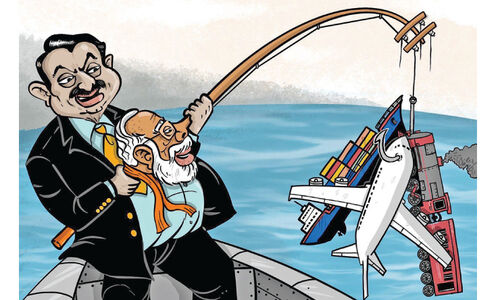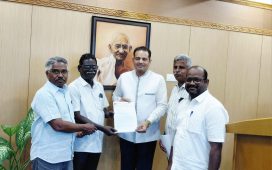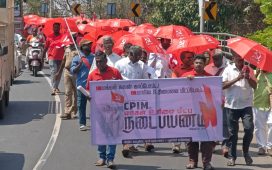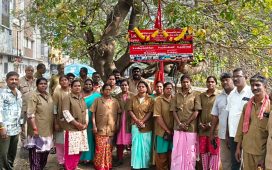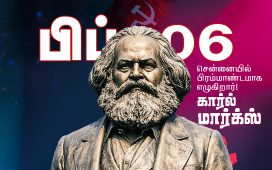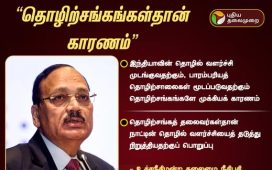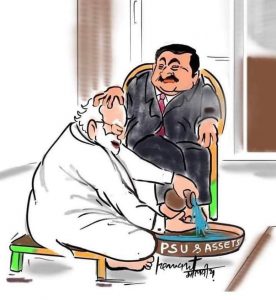 பிரதமர் நரேந்திர மோடி உத்தரப்பிரதேசத்தில் புண்டில்கண்ட் விரைவுச்சாலையை 2022 ஜூலையில் திறந்து வைத்து தேசிய அளவில் சர்ச்சையை கிளப்பினார். அவர் ‘ரெவ்டி’ கலாச்சாரத்திற்கு எதிராகக் குற்றம் சாட்டினார். ரெவ்டி என்பது நம்ம ஊர் எள்ளுருண்டை மாதிரி ஒரு வட இந்திய உணவு. இது பொதுவாக திருவிழாக்களில் இலவசமாக வழங்கப்படும். ரெவ்டி கலாச்சாரத்தில் மூழ்கியவர்களால் விரைவு நெடுஞ் சாலைகளை அமைக்க முடியாது, அரசிடம் இருந்து இலவசங்களை வாங்காமல் இளைஞர்கள் தங்கள் சொந்த காலில் நிற்க வேண்டும் என்று அவர் வலி யுறுத்தினார். அதன் தொடர்ச்சியாக, பாஜக தலைவர் அஸ்வனி குமார் உச்ச நீதிமன்றத்தில் ஒரு பொது நல வழக்கு தொடர்ந்தார். இலவசங்கள் என்ற பொறுப்பற்ற அறிவிப்பை நிறுத்த வேண்டும் என அவர் கேட்டுக் கொண்டுள்ளார். இவை பொதுமக்களின் பணத்தை வீணடித்து மக்களை சோம்பேறிகளாக்குகின்றன. இதற்கு உதாரணம் வேலைவாய்ப்பு உறுதித் திட்டம். இந்த மனுவை உச்சநீதிமன்றம் ஏற்றுக்கொண்டு 3 பேர் கொண்ட அமர்வுக்கு மாற்றியது. அதுமட்டுமின்றி, தலைமை நீதிபதி ரமணாவே இலவசங்களுக்கு எதிராக வலுவான பரிந்துரைகளையும் செய்தார்.
பிரதமர் நரேந்திர மோடி உத்தரப்பிரதேசத்தில் புண்டில்கண்ட் விரைவுச்சாலையை 2022 ஜூலையில் திறந்து வைத்து தேசிய அளவில் சர்ச்சையை கிளப்பினார். அவர் ‘ரெவ்டி’ கலாச்சாரத்திற்கு எதிராகக் குற்றம் சாட்டினார். ரெவ்டி என்பது நம்ம ஊர் எள்ளுருண்டை மாதிரி ஒரு வட இந்திய உணவு. இது பொதுவாக திருவிழாக்களில் இலவசமாக வழங்கப்படும். ரெவ்டி கலாச்சாரத்தில் மூழ்கியவர்களால் விரைவு நெடுஞ் சாலைகளை அமைக்க முடியாது, அரசிடம் இருந்து இலவசங்களை வாங்காமல் இளைஞர்கள் தங்கள் சொந்த காலில் நிற்க வேண்டும் என்று அவர் வலி யுறுத்தினார். அதன் தொடர்ச்சியாக, பாஜக தலைவர் அஸ்வனி குமார் உச்ச நீதிமன்றத்தில் ஒரு பொது நல வழக்கு தொடர்ந்தார். இலவசங்கள் என்ற பொறுப்பற்ற அறிவிப்பை நிறுத்த வேண்டும் என அவர் கேட்டுக் கொண்டுள்ளார். இவை பொதுமக்களின் பணத்தை வீணடித்து மக்களை சோம்பேறிகளாக்குகின்றன. இதற்கு உதாரணம் வேலைவாய்ப்பு உறுதித் திட்டம். இந்த மனுவை உச்சநீதிமன்றம் ஏற்றுக்கொண்டு 3 பேர் கொண்ட அமர்வுக்கு மாற்றியது. அதுமட்டுமின்றி, தலைமை நீதிபதி ரமணாவே இலவசங்களுக்கு எதிராக வலுவான பரிந்துரைகளையும் செய்தார்.
உ.பி தேர்தலும் பாஜக அரசின் இலவசங்களும்
ஓட்டுக்காக தொடர்ந்து இலவசங்களை அறிவிப்ப தற்கு எதிராக கடும் தாக்குதல் நடத்த தேர்வு செய்ய வேண்டிய இடம் உத்தரப்பிரதேசமாகும். உ.பி. தேர்தல் வெற்றிக்கு, ஒன்றிய, மாநில அரசுகளின் இலவசங்கள் முக்கிய காரணம். உ.பி.யில் 3.34 கோடி குடும்பங்கள் உள்ளன. தேர்தலுக்கு முன்பு 7.86 கோடி பிரதமர் ஜன்தன் யோஜனா கணக்குகள் தொடங்கப்பட்டன. ஒரு குடும்பத்திற்கு இரண்டு கணக்குகள்! அவர்களில் 5.33 கோடி பேருக்கு ரூப்பே ஸ்மார்ட் கார்டுகள் வழங்கப் பட்டுள்ளன. 3.4 கோடி பேருக்கு, ரூ.1.8 லட்சம் கோடி பிரதமர் முத்ரா கடன் வழங்கப்பட்டுள்ளது. இது தவிர, கிசான் சம்மான், அடல் பென்ஷன், சாலையோர வியா பாரிகளுக்கு உதவி போன்ற திட்டங்கள் உள்ளன. அவற்றின் விநியோகம் மற்றும் பிரச்சாரத்தில் ஆர்எஸ்எஸ் சங்கிலித் தொடர்பு முன்னணியில் இருந்தது. அப்படியென்றால் ஏன் மோடி இலவசங்களுக்கு எதிராக வசைபாட முடிவு செய்தார்? குஜராத்தில் இலவச அறிவிப்பில் பாஜகவை வீழ்த்தியது ஆம் ஆத்மி. அனைவருக்கும் இலவச மின்சாரம், அனைத்து பெண்களுக்கும் நிதியுதவி என ஆம் ஆத்மி கட்சியில் நீண்ட பட்டியல் உள்ளது. பஞ்சாபில் இதுபோன்ற வாக்குறுதிகளால் ஆம் ஆத்மி கட்சி பலனடைந்துள்ளது. பாஜகவுக்கு செல்வாக்கு இல்லாத மேற்கு வங்கம், ஆந்திரா, தெலுங்கானா, தமிழ்நாடு போன்ற மாநிலங்கள் கடந்த பட்ஜெட்டில் ஏழைகளுக்கு பல சலுகைகளை அறிவித்தன.
மறுபுறம், கேரளா நீண்ட காலத்திற்கு முன்பே இத்தகைய அணுகுமுறையை வகுத்து செயல் படுத்திய மாநிலம். இந்த ஆண்டு மாநில நிதி குறித்த ரிசர்வ் வங்கியின் அறிக்கை ஒவ்வொரு மாநிலத்தின் பட்ஜெட்டிலும் இலவச அறிவிப்புகளை பட்டியலிட்டுள்ளது. அரசியல் ரீதியாக தங்களை எதிர்த்து இலவசங்கள் பயன்படுத்தப்படுவதாக பாஜக குற்றம் சாட்டுகிறது. வேடிக்கை என்னவென்றால், கார்ப்பரேட் நிறுவனங்களுக்கு இலவசங்களை ஒன்றிய அரசு வழங்கலாமாம், ஆனால் மாநிலங்களால் அவற்றை செய்யமுடியாது. உச்ச நீதிமன்றம் உட்பட அனைவரையும் குழப்பும் பிரச்சனை என்னவென்றால், இலவசம் என்ற பிரிவில் சேர்க்கப்பட்டுள்ளவை குறித்த வரையறை இல்லை என்பதாகும். இதில் பணக்காரர்களுக்கான இலவசங்கள் உள்ளதா என்பது முதல் பிரச்சனை. உதாரணமாக, மோடி அரசாங்கத்தின் முதல் மூன்று ஆண்டுகளில், அதானி குழுமம் ரூ.75,000 கோடியை தள்ளுபட யாக பெற்றது. அதேபோல், மோடி அரசு ஆட்சிக்கு வந்த பிறகு, ரூ.10 லட்சம் கோடிக்கும் அதிகமான பொதுத்துறை வங்கிகளின் வராக் கடன் தள்ளுபடி செய்யப்பட்டது.
இதில், சொத்து மறுசீரமைப்பு நிறு வனங்கள் மூலம் இதுவரை இரண்டு லட்சம் கோடி ரூபாய்க்கும் குறைவாகவே வசூலிக்கப்பட்டுள்ளது. வராக் கடன்களில் பெரும் பங்கு கார்ப்பரேட் நிறுவ னங்களுடையது. இவற்றையும் இலவசம் என்று கருத வேண்டாமா? இதுதவிர பணக்காரர்களுக்கு வரிச்சலுகை கிடைக்கிறது. ஒவ்வொரு ஆண்டும் பட்ஜெட்டில் சட்டப்பூர்வமாக அனுமதிக்கப்படும் விலக்குகள் காரணமாக எவ்வளவு வரி தவிர்க்கப்படுகிறது என்ப தைக் கணக்கிட்டால், இது ஒரு லட்சம் கோடி ரூபாய்க்கு மேல் இருக்கும். இது கார்ப்பரேட் நிறுவனங்களுக்கு வழங்கப்படும் மறைமுக இலவசம். இது தவிர மோடி நேரடியாக வழங்கும் கருணைத் தொகை ஆண்டுக்கு 1.5 லட்சம் கோடி ரூபாயாகும். 2019இல் மோடி அமெரிக்கா சென்றார். அதற்கு முன் கார்ப்பரேட் வரி 30 சதவிகிதத்தில் இருந்து 22 சத விகிதமாக குறைக்கப்பட்டது. புதிய நிறுவனங்களுக்கு 15 சதவிகித வரி விதித்தால் போதுமானது. இது எதற்காக செய்யப்பட்டது? முதலாவதாக, வரிகளைக் குறைப்பதே அதிபர் டிரம்பின் லட்சியமாகும். இரண்டாவதாக, கார்ப்பரேட் வரிகள் குறைக்கப் படும்போது, பங்குச் சந்தையில் பங்கு விலைகள் கடு மையாக உயரும். மோடியின் அமெரிக்க வருகையின் போது இதுபோன்ற ஒரு சலசலப்பை பங்குச் சந்தை யில் உருவாக்க கார்ப்பரேட் நிறுவனங்களுக்கு வரி விலக்கு அளிக்கப்பட்டது. இது இந்தியாவின் பட்ஜெட்டை புரட்டிப்போட்டுள்ளது என்றே கூறலாம்.
அதிகரிக்கும் அசமத்துவம்
இந்தியாவில் சமத்துவமின்மை அபாயகரமாக அதிகரித்து வருகிறது. 1991 ஆம் ஆண்டில், ஒரு சத விகிதம் பணக்காரர்கள் தேசிய செல்வத்தில் 16.1 சத விகிதத்தை வைத்திருந்தனர். ஆனால், 2020 இல் அது 42.5 சதவிகிதமாக உயர்ந்தது. அதே நேரத்தில், ஏழ்மையான 50 சதவிகித மக்களின் செல்வப் பங்கு 8.8 சதவிகிதத்திலிருந்து 2.8 சதவிகிதமாகக் குறைந்தது. 1991 ஆம் ஆண்டில், ஒரு சதவிகித பணக்காரர்களின் வரு வாய் பங்கு 10.4 சதவிகிதத்திலிருந்து 2020 இல் 21.7 சத விகிதமாக அதிகரித்தது. இதற்கிடையில், கீழே உள்ள 50 சதவிகிதத்தினரின் பங்கு 22 சதவீதத்திலிருந்து 14.7 சதவிகிதமாகக் குறைந்தது. இதன்மூலம், பணக்காரர் கள் பெரும் பணக்காரர்களாக வளர்ந்து வரும் நேரத்தில் ஏழைகளுக்கு இலவசம் கொடுப்பதில் மிகக் கடுமையான நிதிப் பிரச்சனையை எழுப்பப்படுகிறது. இது பிரதமரின் மேல்தட்டு சார்பை மிகத் தெளிவாக அம்பலப்படுத்துகிறது. கேரளாவில் இலவசங்கள் உலகத்தரமான கல்வி மற்றும் சுகாதாரத்திற்காக வழங்கப்படுகிறது. மாநில மக்கள் இதன் மூலம் பயனடைந்துள்ளனர். கேரளா மற்றும் குஜராத் மக்களின் ஆண்டு தனிநபர் வருமா னம் ரூ.2.25 லட்சம். ஆனால், குஜராத்தின் சாதாரண மக்களை விட கேரளாவின் சாதாரண மக்களின் வாழ்க்கை மிகவும் சிறப்பாக உள்ளது என்பதை மனித வள மேம்பாட்டுக் குறியீடு நிரூபிக்கிறது. ஏராளமான பொது நன்மைகளை உருவாக்கும் இலவச சேவை களை வழங்குவது நல்லது என்பதற்கு கேரளா சாட்சியாக உள்ளது.
தனியார்மயமாக்கலின் ஒரு பகுதியே இலவச ஒழிப்பு
இந்த விமர்சனத்திற்கு பதில் அளிக்கும் வகையில், அவர்கள் முன்வைக்கும் விமர்சனம் அனைத்து மானி யங்களையும் ரத்து செய்வது பற்றியது அல்ல, மின்சா ரம் போன்ற சேவைகளை இலவசம் என்று அறி விப்பது குறித்தே மோடி பக்தர்கள் பேசுகிறார்கள். மின்சாரம், ரயில் போக்குவரத்து, சாலைப் போக்கு வரத்தை தனியார்மயமாக்கும் திட்டத்தை மோடி கொண்டுள்ளார். ஏழைகளுக்கு வழங்கப்படும் இல வசங்கள் இதற்கு தடையாக உள்ளது. உதாரணமாக, விவசாயிகளுக்கு, மின்சாரம் இலவசம்; இதை ஒழித்தால்தான் தனியார்மயமாக்கல் பலனளிக்கும். ஆனால் அதைத் தொட்டபோது பெரும் எதிர்ப்பு கிளம்பியது. இதன் மூலம் பல்வேறு துறைகளில் சலுகைகளை அதிக பிரிவினருக்கு வழங்குவது தனியார்மயத்தை தடுக்கும். ரயில்வே சலுகைகள் ஏற்கனவே குறைக்கப்பட்டுள்ளன. ஒரு காலத்தில் பொறுப்பற்றது என்று விவரிக்கப் பட்ட பள்ளிக்கூடங்களில் இலவச மதிய உணவு போன்றவை தேசிய ஊட்டச்சத்து திட்டங்களாக அங்கீக ரிக்கப்பட்டுள்ளன. மகாராஷ்டிராவில் வேலைப் பாது காப்பு அறிமுகம் அத்தகைய ஒரு பரிசோதனை யாகும். மடிக்கணினிகளின் விநியோகம் டிஜிட்டல் ஏற்றத்தாழ்வைக் குறைத்து கல்வித் தரத்தை உயர்த்து வதற்கான ஒரு படிக்கல்லாகக் கருதப்படுகிறது. இவை சரியாக இருக்கலாம். ஆனால் வண்ணத் தொலைக் காட்சி, வீட்டு உபயோகப் பொருட்கள், புடவைகள் போன்றவற்றை வழங்க வேண்டுமா? அது சூழ்நிலை யைப் பொறுத்தது என்பதே பதில். கோவிட்டின் போது குழந்தைகளின் கல்விக்கு வண்ணத் தொலைக்காட்சி யும் வழங்கினோம் அல்லவா? கேரளாவில் பெண்க ளின் சமையலறை பணிச்சுமையை குறைக்க ஸ்மார்ட் கிச்சன் திட்டம் முன்வைக்கப்பட வில்லையா? குழந்தைகளுக்கான பள்ளி சீருடை திட்டம் கைத் தறிக்கு அளிக்கும் ஊன்றுகோல் அல்லவா? இது தொடர்பாக விவாதங்கள் இருக்கலாம். அவற்றை அரசியல் களத்தில் விடுவது நல்லது. நீதிமன்ற தீர்ப்பு அல்லது சட்டத்தின் அடிப்படையில் முடிவு செய்யக் கூடாது.
மக்கள் முடிவு செய்யட்டும்
குஜராத்தில் ஆம் ஆத்மி அறிவித்துள்ள இலவசங்க ளுக்கு பா.ஜ.கவுக்கு ஏதேனும் எதிர்ப்பு இருந்தால் அதை பிரச்சாரத்தின் போது வெளிப்படையாகக் காட்டுங்கள். அவற்றைச் செயல்படுத்துவதற்கான பண வாய்ப்பைக் குறித்து கேள்வி எழுப்புங்கள். இந்த பணத்தை வைத்து வேறு என்ன செய்யலாம் என்பதை மக்கள் முன் வையுங்கள். மக்கள் முடிவு செய்யட்டும். அதுதான் ஜனநாயகம். ஜனநாயகம் என்பது நவீன தாராளவாத சிந்தனைக்கு அந்நியமானது. தேர்தலின் போது மக்களுக்கு என்ன வாக்குறுதி அளிக்கப்பட்டா லும், தங்களின் விருப்பத்திற்கு ஏற்ப உருவாக்கப்பட்ட நிதிப் பொறுப்புச் சட்டம் போன்றவற்றின் விதிமுறை களின் அடிப்படையில்தான் ஆட்சி அமைக்க வேண்டும் என்பது அவர்களின் வாதம். இதன் மூலம் மக்களுக்கு வழங்கக் கூடிய இலவசங்களுக்கு இயந்திரத்தனமாக வரம்பு விதிக்கும் நகர்வுகளை முறியடிக்க வேண்டும். இவ்வாறான நிலைப்பாடு இலங்கையின் நிலைமை க்கு இந்தியாவை கொண்டு செல்லும் என்று கூறி இந்தியாவை பயமுறுத்த முயற்சி மேற்கொள்ளப் படுகிறது. நாட்டின் நிதிநிலையை சீர்குலைக்கும் வகை யில் இலவசங்களை வழங்குவதை கட்டுப்படுத்த ஏற்கனவே சட்டங்கள் உள்ளன என்பதுதான் உண்மை. நிதிப் பொறுப்புச் சட்டத்தின் கீழ் வருவாய்ப் பற்றாக் குறை இருக்கக் கூடாது. கடனாகப் பெற்ற பணத்தை அரசின் அன்றாடச் செலவுகளுக்கோ அல்லது மானி யங்களுக்கோ பயன்படுத்தக் கூடாது. அத்தகைய கட்டுப்பாடு இருக்கும்போது, அதைத் தாண்டி, என்ன வகையான வருவாய் செலவினங்களைச் செய்ய முடியும் என்பதை பரிந்துரைக்க இன்னும் கடுமையான சட்டத்தை உருவாக்க முயற்சி மேற்கொள்ளப்படுகிறது.
மாநிலங்களுக்கு எதிராக இப்படி பிரச்சாரம் செய்து வரும் ஒன்றிய அரசு தான் இந்த விவகாரத்தில் பொ றுப்பேற்க வேண்டும். நிதிப் பொறுப்புச் சட்டம் 2003-04 இல் நடைமுறைக்கு வந்தது. இன்று வரை ஒன்றிய அர சால் வருவாய் பற்றாக்குறையை போக்க முடிய வில்லை. அது மட்டுமின்றி ஒவ்வொரு ஆண்டும் ஒன்றிய அரசின் வருவாய் பற்றாக்குறை ஜிடிபியில் 23 சத விகிதம் வருகிறது. அதே நேரத்தில், மாநிலங்கள் தொடர்ந்து வருவாய் பற்றாக்குறையை குறைத்து வரு கின்றன. கடந்த பத்தாண்டுகளில் மாநிலங்களின் வருவாய் பற்றாக்குறை மறைந்துவிட்டது. கேரளா போன்ற மாநிலங்களில் மட்டுமே தற்போது வருவாய் பற்றாக்குறை உள்ளது. இதற்குக் காரணம் கேர ளத்தின் கல்வி மற்றும் சுகாதாரத்திற்கான அதிகச் செலவுதான். எனவே இந்த வருவாய் பற்றாக்குறை யை நீக்க வேண்டுமானால், வருவாய் கணிசமாக உயர வேண்டும். ஜிஎஸ்டி மற்றும் ஒன்றிய வரி ஒதுக்கீட்டில் உதவிகரமான அணுகுமுறை இருக்க வேண்டும். இருப்பினும், ஒன்று தெளிவாக உள்ளது. மாநிலங்கள் பொதுவாக பொறுப்புணர்வுடன் நிதியை நிர்வகிக்கின்றன. ஒன்றிய அரசுதான் திருத்திக் கொள்ள வேண்டும்.
டாக்டர் டி.எம்.தாமஸ் ஐசக், கேரள முன்னாள் நிதியமைச்சர்
சிந்தா மலையாள வார இதழிலிருந்து
தமிழில்: சி.முருகேசன்
The Economics and Politics of Freebies – Dr. TM Thomas Isaac
Prime Minister Narendra Modi ignited a national controversy in July 2022 by inaugurating the Bundilkhand Expressway in Uttar Pradesh.
He railed against the ‘Revdi’ culture. Revdi is a North Indian delicacy like our Ellunda. It is usually given free on festivals. Those steeped in Revdi culture cannot build express highways, he urged the youth to stand on their own feet instead of taking freebies from the government.
Not long after, BJP leader Ashwani Kumar filed a Public Interest Litigation in the Supreme Court. It demanded an end to the irresponsible announcement of freebies. These waste public money and make people lazy. An example of this is the employment guarantee scheme. The Supreme Court, on the other hand, accepted the petition on file and referred it to a three-judge bench. Not only that, Chief Justice Ramana himself also made strong remarks against freebies.
UP elections and BJP government’s freebies
Uttar Pradesh is the prime minister’s choice to rail against the irresponsible announcement of freebies for votes. An important factor in the UP election success was the freebies of the central and state governments. There are 3.34 crore families in UP. 7.86 crore PM Jandhan Yojana accounts were opened before the elections. Account for two people in one family! Out of them, 5.33 crore people have been issued rupee smart cards. 1.8 lakh crore PM Mudra loans disbursed to 3.4 crore people. Apart from this, there are schemes like Kisan Samman, Atal Pension and assistance to street vendors. The network of RSS took the initiative for its distribution and propagation.
against state governments
And why did Modi decide to lash out against freebies? Aam Aadmi Party trumps BJP in free announcement in Gujarat Aam Aadmi Party has a long list of free electricity for all, financial assistance for all women. In Punjab, Aam Aadmi Party has benefited from such promises. States like Bengal, Andhra, Telangana and Tamil Nadu, where the BJP does not have an upper hand, announced many benefits for the poor in the last budget.
Kerala, on the other hand, is a state that has devised and implemented such an approach long ago. The Reserve Bank’s report on state finances this year also lists the free announcement in each state’s budget. The BJP alleges that the freebies are being used politically to fight the BJP. The irony is that the Center can, the states cannot.
Freebies for corporates
The problem that confuses everyone, including the Supreme Court, is that there is no system of what is included in the category of free.
The first issue is whether this includes freebies to rich people. For example, within the first three years of the Modi government, the Adani Group had written off Rs 75,000 crore. Similarly, after coming to power, the Modi government has written off bad loans of more than 10 lakh crores of public sector banks. So far, less than two lakh crore rupees have been collected through asset restructuring companies. The lion’s share of bad loans also belong to corporate companies. Shouldn’t these also be considered free?
In addition to this, the rich get tax breaks. Each year’s budget provides an estimate of how much tax is statutorily avoided due to statutory exemptions. In the last few years it will be more than one lakh crore rupees. This is an indirect freebie given to corporates. Apart from this, freebies given by Modi directly amount to Rs 1.5 lakh crore per annum.
Modi visited America in 2019. Shortly before that, the corporate tax rate was reduced from 30 percent to 22 percent. For new companies, 15 percent tax is sufficient. What was this done for? First, President Trump’s ideal is to cut taxes. Second, when corporate taxes fall, stock prices in the stock market rise sharply. Tax exemptions were given to corporates to create such a buzz during their visit to America. It can be said that this has upset the Indian budget.
A helping hand to the poor in the India of the super rich
Inequality in India is increasing alarmingly. In 1991, the richest one percent owned 16.1 percent of the national wealth, rising to 42.5 percent in 2020. At the same time, the wealth share of the poorest 50 percent of people fell from 8.8 percent to 2.8 percent. In 1991, the income share of the richest one percent increased from 10.4 percent to 21.7 percent in 2020.
Meanwhile, the share of the bottom 50 percent fell from 22 percent to 14.7 percent. In such a time when the rich are growing super rich, giving freebies to the poor is the most serious issue in finance, and the elite bias of the Prime Minister is very clear.
We stood for free and universal education and health care in Kerala. The people of the state have also benefited from it. The annual per capita income of the people of Kerala and Gujarat is around Rs 2.25 lakhs. But the Human Resource Development Index shows that the life of the common people of Kerala is much better than the common people of Gujarat. Kerala is witnessing that it is better to provide free services that create a lot of public benefits.
Part of the privatization agenda
In response to this criticism, Modi devotees say that their criticism is not about abolishing all subsidies but about declaring services like electricity free. Modi has an agenda to privatize power, rail transport and road transport. A hindrance to this is the freebies given to the poor. For example, for farmers, electricity is free; Privatization will be effective only if this is stopped. But when it was touched, there was great resistance. Similarly, giving concessions in various sectors to more sections will hinder privatization. Railways have already started reducing freebies.
Things like free school lunches, once described as irresponsible, have since been recognized as national nutrition programs. The beginning of employment guarantee was also an experiment conducted in Maharashtra. The distribution of laptops can be seen as a step towards bridging the digital divide and improving the quality of education.
That may be true. But what about providing color television, home appliances, sarees and more? The answer is that it depends on the situation. Didn’t we also provide color television for children’s education during Kovidu? Hasn’t the Smart Kitchen project been put forward in Kerala to reduce the kitchen workload of women? Isn’t the children’s school uniform project a hand loom? There may be disputes about this. It is preferable to debate them in the political arena. And not to be decided on the basis of court judgment or legislation.
Let the people decide
If the BJP has any objection to the freebies announced by Aam Aadmi in Gujarat, show it openly during the campaign. Ask for an estimate of the money to implement them. Put in front of people what can be done with this money instead. Let the people decide. That is democracy. Democracy is a strand alien to neoliberal thinking.
Their argument is that no matter what is promised to the people during the elections, they should rule on the basis of laws and regulations such as the Fiscal Responsibility Act, which are formed according to their will. Such moves to impose an automatic limit on freebies that can be given to people need to be opposed and defeated.
An attempt is being made to scare India by saying that such a stance will take India to the situation of Sri Lanka. The fact is that there are already laws in place to regulate the giving of freebies, which can wreak havoc on the country’s finances. There should be no revenue deficit under the Fiscal Responsibility Act. Borrowed money should not be used to pay government’s day-to-day expenses or subsidies. When such a restriction exists, the attempt is to go beyond it and make a more stringent law to prescribe what types of revenue expenditure can be incurred.
The Central Govt
The central government, which has come against the states with such a campaign, is in the wrong position in this regard. The Fiscal Responsibility Act came into being in 2003-04. Till date, the central government has not been able to eliminate the revenue deficit. Not only that, every year the central government’s revenue deficit comes to 23 percent of GDP. At the same time, states have consistently reduced their revenue deficits.
The revenue deficit of the states has been eliminated in the last decade. Only states like Kerala currently have a revenue deficit. It is because of our high expenditure on education and health. So if we want to eliminate our revenue deficit, our revenue income should rise significantly. There should be a helpful approach in GST and central tax allocation. However, one thing is clear. The states as a whole have managed the finances with a sense of responsibility.

